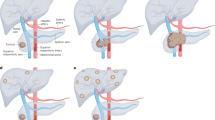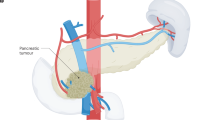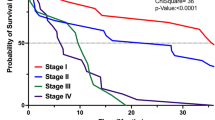Abstract
Surgical resection is the most effective means of controlling nonmetastatic pancreatic cancer, but recurrence rates are high even after complete resection. For several types of tumor of the gastrointestinal tract, combined modality therapy that includes radiation therapy has been shown to reduce the recurrence rate and improve disease-free survival. The use of adjuvant radiotherapy for pancreatic cancer, however, is controversial. Results of the few randomized trials of adjuvant radiotherapy for pancreatic cancer are conflicting. In addition, as pancreatic cancer is associated with high rates of distant recurrence, the additional benefit provided by local therapy has been perceived as questionable. This article reviews the studies—prospective and retrospective—of adjuvant radiotherapy for pancreatic cancer and the issues surrounding the use of this strategy.
Key Points
-
The use of adjuvant radiotherapy for resected pancreatic cancer is controversial, and results of randomized controlled trials are conflicting
-
In the absence of adjuvant therapy, local failure rates could exceed 50% after resection of pancreatic adenocarcinoma
-
The rationale for adjuvant radiotherapy for pancreatic adenocarcinoma is to improve locoregional control
-
Modern radiation delivery techniques permit dose escalation in order to reduce normal tissue toxic effects and simultaneously deliver increased doses of radiation to affected areas
-
Future randomized controlled trials for resected pancreatic cancer should strive to identify subgroups of patients most likely to benefit from adjuvant radiotherapy
This is a preview of subscription content, access via your institution
Access options
Subscribe to this journal
Receive 12 print issues and online access
$209.00 per year
only $17.42 per issue
Buy this article
- Purchase on Springer Link
- Instant access to full article PDF
Prices may be subject to local taxes which are calculated during checkout
Similar content being viewed by others
References
Jemal A et al. (2007) Cancer statistics, 2007. CA Cancer J Clin 57: 43–66
Sener S et al. (1999) Pancreatic cancer: a report of treatment and survival trends from 100,313 patients diagnosed from 1985–1995, using the National Cancer Database. J Am Coll Surg 189: 1–7
Nitecki SS et al. (1995) Long-term survival after resection for ductal adenocarcinoma of the pancreas: is it really improving? Ann Surg 221: 59–66
Piorkowski RJ et al. (1982) Pancreatic and periampullary carcinoma: experience with 200 patients over a 12 year period. Am J Surg 143: 189–193
Richter A et al. (2003) Long-term results of partial pancreaticoduodenectomy for ductal adenocarcinoma of the pancreatic head: 25-year experience. World J Surg 27: 324–329
Cameron JL et al. (2006) One thousand consecutive pancreaticoduodenectomies. Ann Surg 244: 10–15
Wagner M et al. (2004) Curative resection is the single most important factor determining outcome in patients with pancreatic adenocarcinoma. Br J Surg 91: 586–594
Geer RJ and Brennan MF (1993) Prognostic indicators for survival after resection of pancreatic adenocarcinoma. Am J Surg 165: 68–72
Tepper J et al. (1976) Carcinoma of the pancreas: review of MGH experience from 1963 to 1973—analysis of surgical failure and implications for radiation therapy. Cancer 37: 1519–1524
Griffin JF et al. (1990) Patterns of failure after curative resection of pancreatic carcinoma. Cancer 66: 56–61
Whittington R et al. (1991) Adjuvant therapy of resected adenocarcinoma of the pancreas. Int J Radiat Oncol Biol Phys 21: 1137–1143
Ozaki H (1992) Improvement of pancreatic cancer treatment from the Japanese experience in the 1980s. Int J Pancreatol 12: 5–9
Westerdahl J et al. (1993) Recurrence of exocrine pancreatic cancer—local or hepatic? Hepatogastroenterology 40: 384–387
Hishinuma S et al. (2006) Patterns of recurrence after curative resection of pancreatic cancer, based on autopsy findings. J Gastrointest Surg 10: 511–518
Smeenk HG et al. (2007) Long-term survival and metastatic pattern of pancreatic and periampullary cancer after adjuvant chemoradiation or observation: long-term results of EORTC trial 40891. Ann Surg 246: 734–740
Winter JM et al. (2006) 1,423 pancreaticoduodenectomies for pancreatic cancer: a single-institution experience. J Gastrointest Surg 10: 1199–1210
Sperti C et al. (1997) Recurrence after resection for ductal adenocarcinoma of the pancreas. World J Surg 21: 195–200
Raut CP et al. (2007) Impact of resection status on pattern of failure and survival after pancreaticoduodenectomy for pancreatic adenocarcinoma. Ann Surg 246: 52–60
Kalser MH et al. (1985) Pancreatic cancer: adjuvant combined radiation and chemotherapy following curative resection. Arch Surg 120: 899–903
Gastrointestinal Tumor Study Group (1987) Further evidence of effective adjuvant combined radiation and chemotherapy following curative resection of pancreatic cancer. Cancer 59: 2006–2010
Klinkenbijl JH et al. (1999) Adjuvant radiotherapy and 5-fluorouracil after curative resection of cancer of the pancreas and periampullary region: phase III trial of the EORTC gastrointestinal tract cancer cooperative group. Ann Surg 230: 776–782
Neoptolemos JP et al. (2001) Adjuvant chemoradiotherapy and chemotherapy in resectable pancreatic cancer: a randomised controlled trial. Lancet 358: 1576–1585
Neoptolemos JP et al. (2004) A randomized trial of chemoradiotherapy and chemotherapy after resection of pancreatic cancer. N Engl J Med 350: 1200–1210
Wolff A et al. (2006) Neoplasms of the exocrine pancreas. In Cancer Medicine, edn 7, 1331–1358. London: BC Decker Inc.
Burris HA et al. (1997) Improvements in survival and clinical benefit with gemcitabine as first-line therapy for patients with advanced pancreas cancer: a randomized trial. J Clin Oncol 15: 2403–2413
Rothenberg ML et al. (1996) A phase II trial of gemcitabine in patients with 5-FU-refractory pancreas cancer. Ann Oncol 7: 347–353
Regine WF et al. (2008) Fluorouracil vs gemcitabine chemotherapy before and after fluorouracil-based chemoradiation following resection of pancreatic adenocarcinoma: a randomized controlled trial. JAMA 299: 1019–1026
Abrams RA et al. (2007) RTOG 9704: radiotherapy quality assurance (QA) review and survival. Int J Radiat Oncol Biol Phys 66 (Suppl 1): 522
Oettle H et al. (2007) Adjuvant chemotherapy with gemcitabine vs observation in patients undergoing curative-intent resection of pancreatic cancer: a randomized controlled trial. JAMA 297: 267–277
Kleeff J et al. (2007) Surgical treatment of pancreatic cancer: the role of adjuvant and multimodal therapies. Eur J Surg Oncol 33: 817–823
Chua YJ and Cunningham D (2005) Adjuvant treatment for resectable pancreatic cancer. J Clin Oncol 23: 4532–4537
Willett C et al. (2007) Adjuvant therapy of pancreatic cancer. Cancer J 13: 185–191
Garofalo M et al. (2006) The case for adjuvant chemoradiation for pancreatic cancer. Best Pract Res Clin Gastroenterol 20: 403–416
Zuckerman DS and Ryan DP (2008) Adjuvant therapy for pancreatic cancer: a review. Cancer 112: 243–249
Foo ML et al. (1993) Patterns of failure in grossly resected pancreatic ductal adenocarcinoma treated with adjuvant irradiation +/− 5 fluorouracil. Int J Radiat Oncol Biol Phys 26: 483–489
Yeo CJ et al. (1994) Adenocarcinoma of the pancreas: factors influencing outcome after pancreaticoduodenectomy—the Johns Hopkins experience. Cancer Bull 46: 504–510
Whittington R et al. (1995) Protracted intravenous fluorouracil infusion with radiation therapy in the management of localized pancreaticobiliary carcinoma: a phase I Eastern Cooperative Oncology Group Trial. J Clin Oncol 13: 227–232
Yeo CJ et al. (1997) Pancreaticoduodenectomy for pancreatic adenocarcinoma: postoperative adjuvant chemoradiation improves survival: a prospective, single-institution experience. Ann Surg 225: 621–633
Hsu C et al. (2008) Benefit of adjuvant chemoradiation therapy for pancreatic adenocarcinoma: the Johns Hopkins Hospital–Mayo Clinic collaborative study of 1,045 patients [abstract #124]. In Proceedings of the ASCO 2008 Gastrointestinal Cancers Symposium: 2008 January 25–27, Orlando, FL
Corsini MM et al. (2008) Adjuvant radiotherapy and chemotherapy for pancreatic carcinoma: the Mayo Clinic experience (1975–2005). J Clin Oncol 26: 3511–3516
Herman JM et al. (2008) Analysis of fluorouracil-based adjuvant chemotherapy and radiation after pancreaticoduodenectomy for ductal adenocarcinoma of the pancreas: results of a large, prospectively collected database at the Johns Hopkins Hospital. J Clin Oncol 26: 3503–3510
Hazard L et al. (2007) Radiation therapy is associated with improved survival in patients with pancreatic adenocarcinoma: results of a study from the Surveillance, Epidemiology, and End Results (SEER) registry data. Cancer 110: 2191–2201
Picozzi VJ et al. (2003) Interferon-based adjuvant chemoradiation therapy after pancreaticoduodenectomy for pancreatic adenocarcinoma. Am J Surg 185: 476–480
Picozzi VJ et al. (2008) ACOSOG Z05031: report on a multicenter, phase II trial for adjuvant therapy of resected pancreas cancer using cisplatin, 5-FU, and alpha-interferon [abstract]. J Clin Oncol 26 (Suppl): a4505
Landry JC et al. (2002) Treatment of pancreatic cancer tumors with intensity-modulated radiation therapy (IMRT) using the volume at risk approach (VARA): employing dose-volume histogram (DVH) and normal tissue complication probability (NTCP) to evaluate small bowel toxicity. Med Dosim 27: 121–129
Milano MT et al. (2004) Intensity-modulated radiotherapy in treatment of pancreatic and bile duct malignancies: toxicity and clinical outcome. Int J Radiat Oncol Biol Phys 59: 445–453
Lim JE et al. (2003) Prognostic factors following curative resection for pancreatic adenocarcinoma: a population-based, linked database analysis of 396 patients. Ann Surg 237: 74–85
Crane CH et al. (2001) Phase I study of concomitant gemcitabine and IMRT for patients with unresectable adenocarcinoma of the pancreatic head. Int J Gastrointest Cancer 30: 123–132
Bai YR et al. (2003) Intensity modulated radiation therapy and chemotherapy for locally advanced pancreatic cancer: results of feasibility study. World J Gastroenterol 9: 2561–2564
Abbruzzese JL (2008) Adjuvant therapy for surgically resected pancreatic adenocarcinoma. JAMA 299: 1066–1067
Shah D et al. (2008) Preoperative prediction of complete resection in pancreatic cancer. J Surg Res 147: 216–220
Regine W et al. (2007) Post-resectional CA 19-9 values>90 are associated with significantly worse survival in patients with pancreatic carcinoma treated with adjuvant therapy in RTOG 9704—implications for current and future trials. Int J Rad Oncol Biol Phys 69 (Suppl 1): S78
Author information
Authors and Affiliations
Corresponding author
Ethics declarations
Competing interests
Ralph R Weichselbaum is a consultant and stockholder for GenVec Inc. The other authors declared no competing interests.
Rights and permissions
About this article
Cite this article
Gutt, R., Liauw, S. & Weichselbaum, R. Adjuvant radiotherapy for resected pancreatic cancer: a lack of benefit or a lack of adequate trials?. Nat Rev Gastroenterol Hepatol 6, 38–46 (2009). https://doi.org/10.1038/ncpgasthep1301
Received:
Accepted:
Published:
Issue Date:
DOI: https://doi.org/10.1038/ncpgasthep1301
This article is cited by
-
Imaging findings of recurrent pancreatic cancer following resection
Abdominal Radiology (2018)



